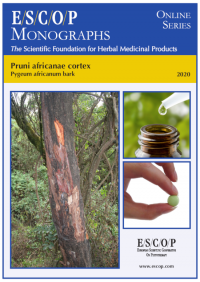
ESCOP monographs The Scientific Foundation for Herbal Medicinal Products. Online series. Pruni africanae cortex (Pygeum africanum bark). Exeter: ESCOP; 2020.
Pruni africanae cortex
Pygeum africanum bark
Prunus africana (Hook f.) Kalkman (syn: Pygeum africanum Hook f.)
Published 2020
Format: PDF
Descargar monografía (15 euros para el público general, 12 euros para los socios de SEFIT
Ver online todas las monografías de ESCOP (30 euros por año, gratis para los socios de SEFIT)
SUMMARY
The herbal monograph selects and summarises scientific studies and textbooks regarding efficacy, dosage, and safety to support the therapeutic uses of pygeum bark.
This herbal drug, by definition, consists of the whole or fragmented, dried bark of the stems and branches of Prunus africana (Hook f.) Kalkman.
Studies with its main characteristic constituents phytosterols, free fatty acids, pentacyclic triterpenic acids, long-chain aliphatic alcohols, their trans-ferulic acid esters, and the phenolic ester tartaric acid are included.
The therapeutic indications are the symptomatic treatment of micturition disorders (dysuria, pollakiuria, nocturia, urine retention) in benign prostatic hyperplasia (BPH) at Stages I, II, and III as defined by Alken and Vahlensieck.
Administration of pygeum bark address posology; its duration of use; contra-indications; special warnings; special precautions for use; undesirable effects; overdose.
In vitro experiments with pygeum bark and its extracts demonstrated hormonal effects such as antiandrogenic activity, as well as anti-inflammatory, antiproliferative, antioxidant and antibacterial activities. In vivo experiments with pygeum bark and its extracts demonstrated effects on the prostate, on bladder function, and anti-inflammatory activity.
Pharmacological studies in humans, after oral administration of lipophilic extracts, concerned improvement of capillary perfusion and secretory activity of the prostate, as well a reduction in the volume of a hypertrophic prostate and it reduced prostatic inflammation.
Controlled clinical studies in humans with pygeum bark extracts evaluated in a systematic review of 17 randomized, double-blind controlled trials, demonstrated that pygeum bark modestly, but significantly (p<0.001 to p<0.05), improved urologic symptoms and flow measures in BPH. Further reviews involving 1310 patients concluded that pygeum bark improved the symptoms and objective measures of BPH and was well tolerated.
Preclinical safety data were assessed in toxicity studies in mice, rats, rabbits and dogs.
Safety data assessed in human clinical studies involving 2872 patients provided information on specific adverse events. Adverse events due to pygeum bark were generally mild in nature and similar in frequency to placebo.
The selection of literature cited in the monograph is aimed at bringing together relevant information about the possible physiological roles of pygeum africanum bark and its major constituents.
KEYWORDS
- Pruni africanae cortex
- Pygeum africanum bark
- Prunus africana (Hook f.) Kalkman (syn: Pygeum africanum Hook f.)
- Disorders of the lower urinary tract
- Micturition disorders (dysuria, pollakiuria, nocturia, urine retention) in benign prostatic hyperplasia (BPH) at stages I, II and III.
